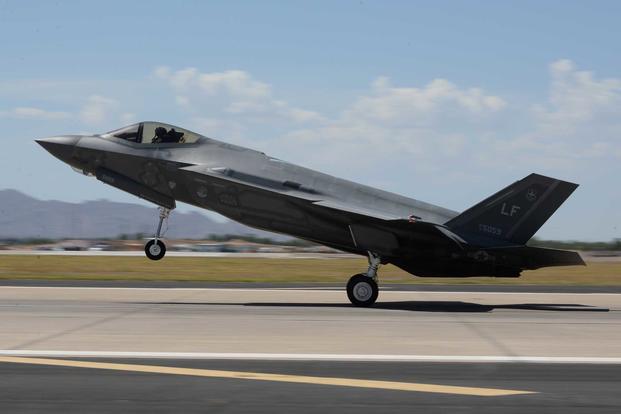Two F-35A Joint Strike Fighters are still slated to be delivered to Luke Air Force Base, Arizona, for the Turkish pilot training program unless new direction from the Defense Department, expected in November, prohibits the move, Military.com has learned.
Luke is expected to receive two more of the fifth-generation fighters for the program in early 2019, according to an industry source familiar with the matter. The base already has two jets for the training program.
Furthermore, the first two fifth-generation fighters are still on track to fly to Turkey sometime between July and September next year, barring any new evidence from Defense Secretary Jim Mattis and Secretary of State Mike Pompeo that the transfer must be indefinitely blocked per the 2019 National Defense Authorization Act (NDAA), the source said.
For now, "there has been no change to our contract or our relationship with Turkey as a partner, with Turkey as a supplier. Nothing's changed," said Greg Ulmer, vice president and general manager of the F-35 program at Lockheed Martin Corp.
Related content:
- US Still Hopes to Sway Turkey to Buy Patriot Missiles over S-400
- The Air Force Needs Army's Help to Best Russia's S-400 Missile Battery
- Lawmakers Again Attempt to Block F-35 Sale to Turkey
Ulmer sat down with Military.com at the annual Air Force Association Air, Space and Cyber conference earlier this month.
"The decision relative to the NDAA language is really government-to-government. They have to decide," Ulmer said. "Business is normal; [we're] still supporting the program."
A Defense Department spokesman said the program of record will continue until the report is delivered to Congress. Per the NDAA, Mattis and Pompeo have until mid-November to submit a report to lawmakers describing the current U.S.-Turkey relationship and whether keeping the F-35 from Turkey would hurt production, training or other partnerships.
The spokesman said Tuesday that, once produced, the report will be classified and likely won't be submitted to lawmakers until November. It's possible that Mattis may visit Capitol Hill for closed meetings on the matter.
Luke personnel also emphasized that the training course has not shifted or changed.
"There has been no change to training or aircraft delivery at Luke Air Force Base," said 56th Fighter Wing spokeswoman Maj. Rebecca Heyse during a phone call. "Pending official guidance from [the Office of the Secretary of Defense], there has been no change to the Turkish pilot training or aircraft delivery."
Turkey, a NATO ally and coalition member in the fight against the Islamic State, plans to buy more than 100 F-35As, the conventional takeoff and landing model of the stealth fighter.
In conjunction with Lockheed Martin, Turkish defense companies already help produce part of the plane.
The juxtaposition of the two efforts highlights the complex relationship the U.S. has with Turkey, which hosts Incirlik Air Base, a key Air Force hub.
But lawmakers and U.S. officials in recent months have not been happy that Turkey has made a deal for Russia's S-400 system, known by Moscow as the "F-35 killer."
Earlier this year, Turkey firmed up a $2.5 billion deal for the purchase of S-400 surface-to-air missile systems.
Turkey last July agreed to purchase four Russian-made S-400 mobile missile batteries over the next few years. It finalized the deal in September 2017.
It was one of a few reasons cited in the NDAA for halting additional sales to the NATO-member country.
Another reason is the ongoing captivity of American pastor Andrew Brunson, who was arrested in 2016 on charges of being a spy after an attempted coup d'etat against Turkish President Recep Tayyip Erdoğan. Section 1278 of the budget bill raises concerns about Brunson, as well as all Americans being held by the Erdogan government, according to the Bipartisan Policy Center.
-- Oriana Pawlyk can be reached at oriana.pawlyk@military.com. Follow her on Twitter at @Oriana0214.










